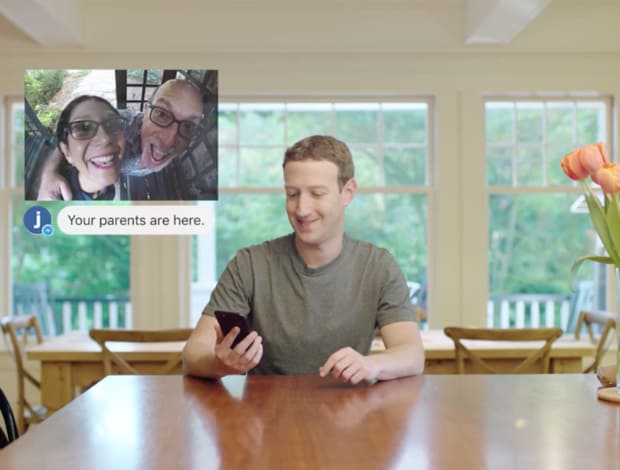My feeling about Facebook has long been that it’s the McDonald’s of communication—cheap, easy and bad for you—but that may not be fair to the Golden Arches. The fast-food chain will gladly pour sludge in your aortic valves in exchange for a modest fee, but it’s main interest is not in sizing you up, surveilling you and selling your attention to anyone with money to spend, be they capitalists or Nazis or the Kremlin. Mark Zuckerberg may see his “nation” of users as the next step in global comity, but it’s instead just a mirror, a magnifier, held up to this menacing American moment, with strong supporting roles for Putin thugs and all manner of chaos agents.
Eric Schmidt once called the Internet the “largest experiment in anarchy that we have ever had.” That’s what it still is, despite Zuckerberg wanting us to believe the his enormous piece of the real estate is a bright, welcoming place for the whole family. Facebook and Google were in the news today again for all the wrong reasons. In the wake of the horrific mass shooting in Las Vegas, both companies were used to spread “hoaxes, completely unverified rumors, failed witch hunts, and blatant falsehoods.” Algorithms were again insufficient.
Many of us have looked at Zuckerberg’s 2017 “listening tour,” his manifesto and his hiring of a former Hillary Clinton pollster as perhaps a prelude to a Presidential run, but it could be that he fears his empire walls have begun to crumble. A legal and political reckoning will come for what went on during the 2016 election, and depending on the severity of what’s learned, oversight could be on the table for communications platforms like Facebook and Google and Twitter, which may not be too big to fail but too big to succeed.
Two excerpts follow.
_________________________
In a New York essay by Max Read:
Nowhere was this confusion about Facebook’s and Zuckerberg’s role in public life more in evidence than in the rumors that the CEO was planning to run for president. Every year, Zuckerberg takes on a “personal challenge,” a sort of billionaire-scale New Year’s resolution, about which he posts updates to his Facebook page. For most Facebook users, these meticulously constructed and assiduously managed challenges are the only access they’ll ever have to Zuckerberg’s otherwise highly private personal life. Thousands of people cluster in the comments under his status updates like crowds loitering outside Buckingham Palace, praising the CEO, encouraging him in his progress, and drawing portraits of his likeness.
This year, Zuckerberg’s challenge has been to meet people in all the states of the U.S. that he hadn’t yet visited. His first stop, in January, was Texas; since then, he’s been to 24 other states. Zuckerberg has adamantly denied that the trips are a trial run for the campaign trail, and, having spoken with many of the people he’s met with over the course of his journeys—not to mention stern Facebook publicists — I tend to believe him. He limits his tour activity to interactions in private groups or unannounced visits — no speeches, no barnstorms, no baby-kissing. He’s issued no policy prescriptions and inserted himself into political debates rarely and in limited ways. And yet, the road trip sure looks like a campaign — or at least the sort of “listening tour” that politicians sometimes stage to convince voters, before even announcing, that their hearts are in the right place.
To some extent, of course, the media curiosity is his own fault. (After all, he did choose to be professionally photographed while eating fried food and staring intently at machinery.) But it’s hard for me not to think that the incessant speculation is a function of our own incomplete view of Facebook. The Zuckerberg-for-president interpretation of his project understands Facebook as a large, well-known company, from which a top executive might reasonably launch a political career within the recognizable political framework of the U.S. electoral process.
But if Facebook is bigger, newer, and weirder than a mere company, surely his trip is bigger, newer, and weirder than a mere presidential run. Maybe he’s doing research and development, reverse-engineering social bonds to understand how Facebook might better facilitate them. Maybe Facebook is a church and Zuckerberg is offering his benedictions. Maybe Facebook is a state within a state and Zuckerberg is inspecting its boundaries. Maybe Facebook is an emerging political community and Zuckerberg is cultivating his constituents. Maybe Facebook is a surveillance state and Zuckerberg a dictator undertaking a propaganda tour. Maybe Facebook is a dual power — a network overlaid across the U.S., parallel to and in competition with the government to fulfill civic functions — and Zuckerberg is securing his command. Maybe Facebook is border control between the analog and the digital and Zuckerberg is inspecting one side for holes. Maybe Facebook is a fleet of alien spaceships that have colonized the globe and Zuckerberg is the viceroy trying to win over his new subjects.
Or maybe it’s as simple as this: If you run a business and want to improve it, you need to spend time talking to your customers. If you’ve created a hybrid state–church–railroad–mall–alien colony and want to understand, or expand, it, you need to spend time with your hybrid citizen-believer-passenger-customer-subjects.•
· · ·
In Read’s analysis, there’s also this passage: “The nightmare possibility is that the money was spent strategically in an effort to selectively target swing voters with specific interests in important electoral districts — white working-class Obama voters in Michigan who’d joined anti-immigrant Facebook groups, say — pushing divisive issues that encouraged or discouraged certain voting patterns.” Each day, this possibility becomes more likely a plausibility.
The opening of Mike Isaac and Scott Shane’s NYT piece “Facebook’s Russia-Linked Ads Came in Many Disguises,” which may be flawed only by using past tense in the title:
SAN FRANCISCO — The Russians who posed as Americans on Facebook last year tried on quite an array of disguises.
There was “Defend the 2nd,” a Facebook page for gun-rights supporters, festooned with firearms and tough rhetoric. There was a rainbow-hued page for gay rights activists, “LGBT United.” There was even a Facebook group for animal lovers with memes of adorable puppies that spread across the site with the help of paid ads.
Federal investigators and officials at Facebook now believe these groups and their pages were part of a highly coordinated disinformation campaign linked to the Internet Research Agency, a secretive company in St. Petersburg, Russia, known for spreading Kremlin-linked propaganda and fake news across the web. They were described to The New York Times by two people familiar with the social network and its ads who were not authorized to discuss them publicly.
Under intensifying pressure from Congress and growing public outcry, Facebook on Monday turned over more than 3,000 of the Russia-linked advertisements from its site over to the Senate and House intelligence committees, as well as the Senate Judiciary Committee. The material is part of an attempt to learn the depth of what investigators now believe was a sprawling foreign effort spanning years to interfere with the 2016 United States presidential election.
“We’re obviously deeply disturbed by this,” Joel Kaplan, Facebook vice president for United States public policy, said in an interview. “The ads and accounts we found appeared to amplify divisive political issues across the political spectrum,” including gun rights, gay rights issues and the Black Lives Matter movement.•


